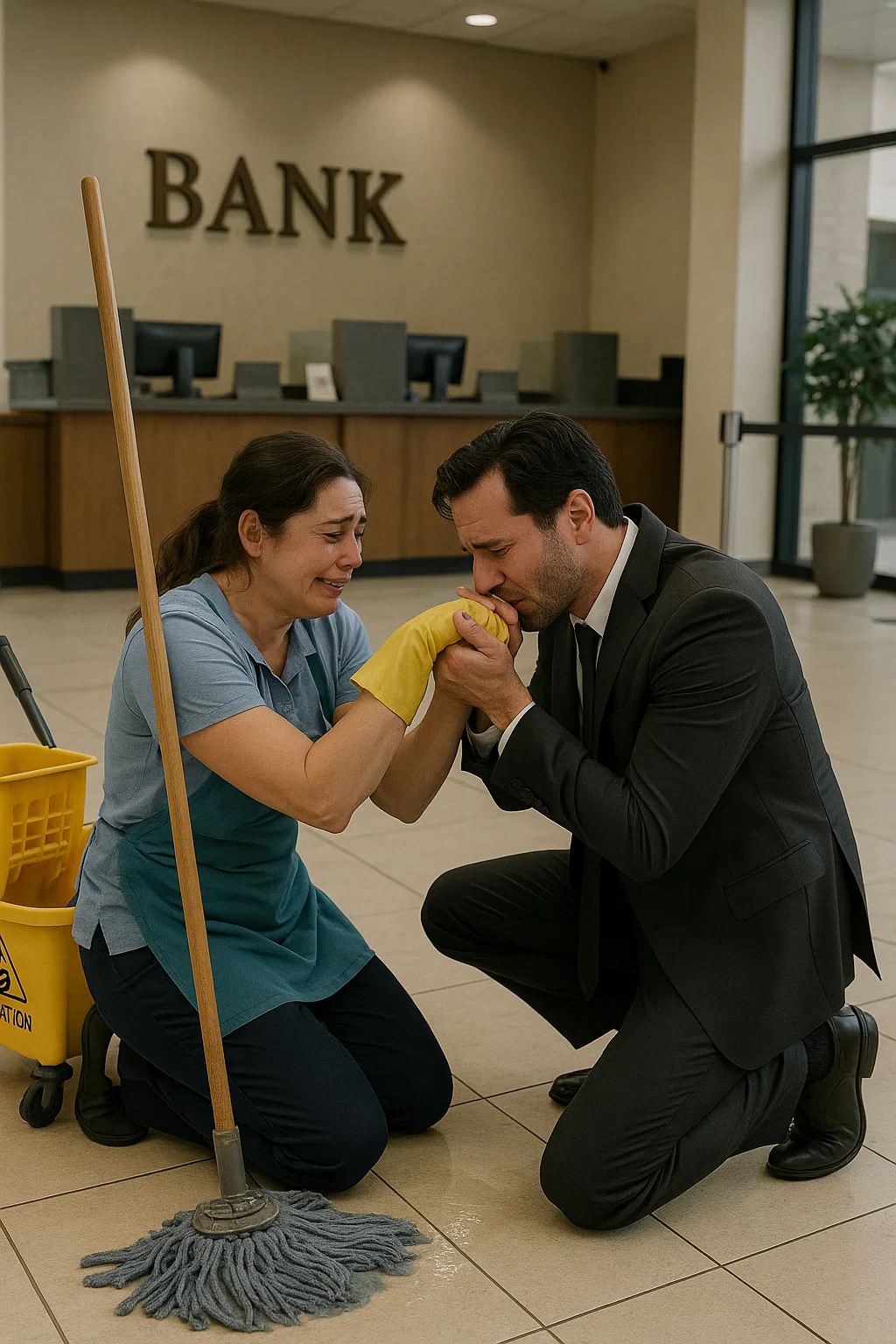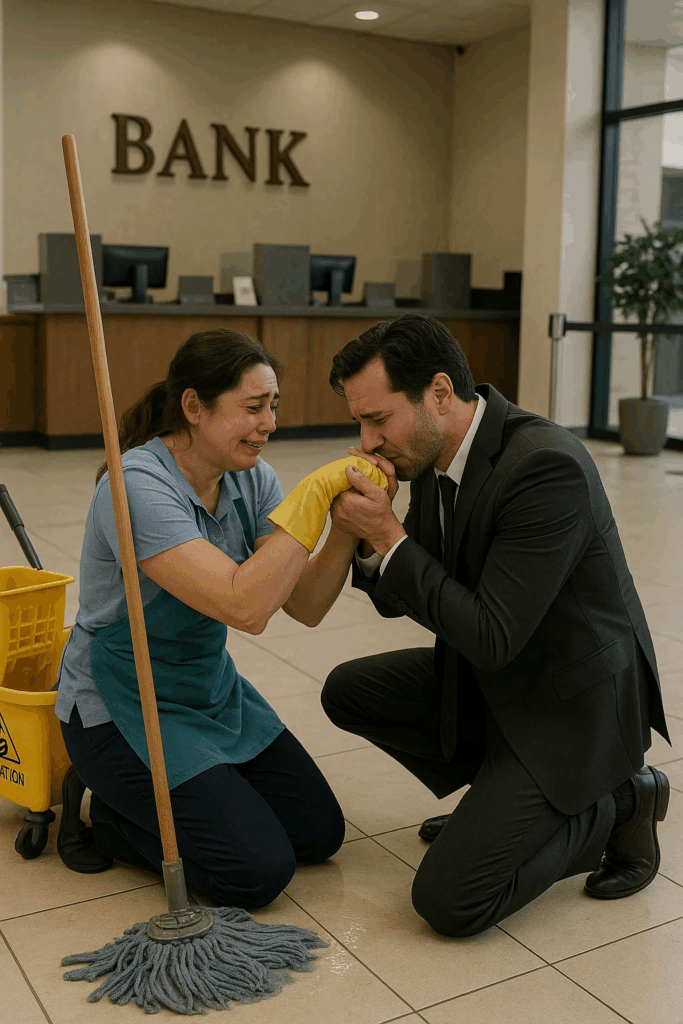Silent for Three Years — And Then She Spoke the Moment He Knelt Before Her
For months, no one at the bank knew her real name.
Every dawn, she arrived before the sun crested the skyline — headscarf neatly tied, a gray turtleneck draped close to her frame. She moved without sound, gliding through the marble corridors like a shadow scented faintly of lemon and rain.
The brass door handles shone under her careful hands. The polished floors mirrored the overhead lights like still ponds. Yet when people passed her, their gazes slid over her as if she were nothing more than another fixture in the building.
Whispers trailed in her wake.
“She’s strange… never says a word.”
“Probably not right in the head.”
She never flinched, never looked up — just kept working with steady, gloved hands and eyes fixed to the floor.
On the books, she was “Aleptina.” To her colleagues, she was just the cleaner.
But years ago, she had been someone else entirely.
Her true name was Alia.

Once, she had been a teacher — the kind children trusted instantly. In the evenings, she painted in watercolors: bright flowers, shafts of sunlight spilling over paper. Her life was simple, but complete.
Until everything was ripped away one summer night.
The last brushstroke of lilac on her canvas was still wet when an acrid scent seeped into her apartment — not food, but something far more sinister.
Then came the screams.
Smoke slipped under her door. Alia snatched her father’s toolbox and ran into the hall. Across the way lived a boy named Lesha and his parents. Their door was locked tight.
She wedged a crowbar into the frame. Wood splintered. Heat blasted her face.
Flames climbed the walls. Black smoke clawed her lungs. On the floor lay Lesha, limp, his mother collapsed beside him.
Alia gathered the boy into her arms. But the hallway was already swallowed by fire.
“Window,” she gasped, stumbling toward the light.
Below, firefighters shouted, holding a rescue net taut. She lowered Lesha into their hands.
The heat roared behind her, her vision tunneling — and then, nothing.
She woke days later in a hospital, her arms and back wrapped in bandages.
Lesha had survived. His mother hadn’t. His father had vanished without a trace.
The burns took months to heal. But the silence… it never did.
Her own mother’s heart had given out from the shock. And when she died, Alia’s voice went with her.
Doctors called it psychogenic mutism. Alia called it emptiness.
She left her classroom for good. Days blurred into nights inside a tiny apartment, her only companions a tank of fish and her paints.
Her father eventually persuaded her to move somewhere cheaper. Cleaning work followed — quiet, solitary work where conversation wasn’t required.
That’s how she ended up at the bank. Three months passed without change.
Until the morning the black sedan arrived.
It slid to the curb, and out stepped a man in a sharp suit, his sunglasses slicing the sunlight. Staff murmured among themselves.
The regional director.
He strode toward the doors, but halfway there, he froze.
His eyes locked on her.
Bent over the brass handles, her yellow gloves caught the light. She didn’t notice him until his polished shoes appeared in her reflection.
She straightened, startled — and then, to everyone’s shock, he walked straight to her.
And knelt.
Wordlessly, he peeled off her gloves. His hands shook as he turned her palms upward, exposing the twisted white scars.
Then, in front of the stunned lobby, he pressed his lips to them.
“Alia,” he whispered, voice cracking, “I’ve searched for you for years.”
The air seemed to freeze. Phones stopped ringing.
“You saved my son,” he said. “You saved me.”
Her mind reeled. Son?
Lesha.
Her knees weakened. She gripped the counter for balance.
The man — Sergei Mikhailovich — spoke in a rush, afraid she might vanish again. He told her how grief had driven him away after the fire, how her name had never made the papers, how every trail had gone cold.
And now, here she was.
“I owe you everything,” he murmured. “Please… come with me.”
Her lips quivered. A sound rose in her throat, rough and unused.
One word emerged.
“…Lesha?”
Sergei’s eyes glistened. He nodded. “He’s studying medicine. Because of you. Because you showed him — without saying a word — what it means to save a life.”
In the weeks that followed, the world she’d hidden from began to seep back in. Surgeons offered to repair her scars. Therapists coaxed her voice out of the shadows.
News spread of the “silent cleaner who rescued a child.” The same colleagues who once whispered now stepped aside respectfully.
But Alia wanted none of the praise.
She wanted only to paint.
Months later, she stood in a small gallery, surrounded by watercolors of lilacs, firelight, and hands — always hands — reaching toward one another.
That’s when she saw him.
A young man, tall, slightly awkward, with gentle eyes.
“Hi,” he said softly. “I’m Lesha.”
Her heart tightened. She reached for him. His hand fit into hers — the same small hand she had passed through a burning window years before.
They stood in silence, but this silence wasn’t empty.
It was full.
Because heroes, she now knew, don’t always need medals or capes. Sometimes, they only need the strength to keep holding on — even when the rest of the world lets go.


